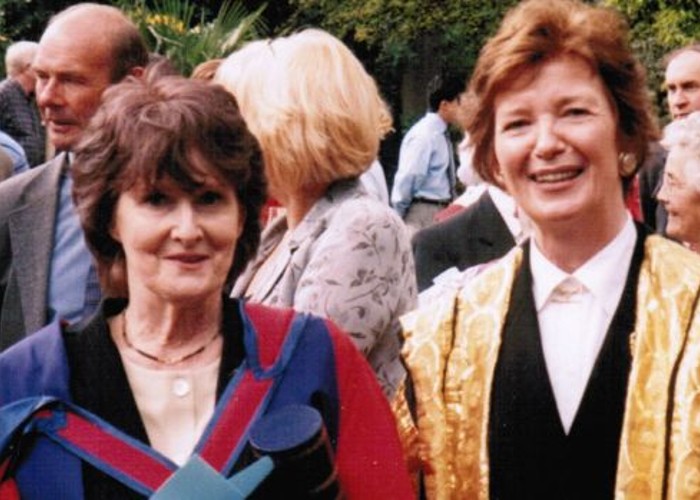Trinity College Dublin is renaming the Library (former Berkeley Library) after the acclaimed Irish poet Eavan Boland. This decision was made by the University Board today [9 October 2024] after a period of research, analysis and public consultation overseen by the Trinity Legacies Review Working Group (TLRWG).

The Eavan Boland Library will be the first building on Trinity’s campus to be named after a woman.
Eavan Boland was one of the foremost women in Irish literature, publishing many collections of poetry, a memoir Object Lessons (1995), as well as teaching and lecturing in Ireland and in the US.
It had been decided in April 2023 that the continued use of George Berkeley’s name on its main Library was inconsistent with the University’s core values of human dignity, freedom, inclusivity, and equality. Since then, its largest Library has been known simply as ‘The Library’.
In September 2024, after a process of deliberation including consideration of the 855 public submissions, the TLRWG identified several options for the renaming of the Library, with their preferred recommendation being The Eavan Boland Library.
A paper by TLRWG member Catriona Crowe noted that Boland’s “great achievement was to move women from the object (muse, dream, symbol) of poetry to the subject who was writing the poem”. Her name, she wrote, “would bring a magnificent poetic, scholarly and feminist reputation to a building dedicated to the humanities”.
Provost Dr Linda Doyle said:
It is a fitting recognition of Eavan Boland’s poetic genius that our main Library, used by so many students and staff, will now carry her name.
Eavan’s poetry is well known across the generations, and her outstanding artistic contribution to highlighting the role of women in Irish society is widely appreciated.
I want to sincerely thank everyone who participated in the process that has led us to today’s decision. It was marked by broad consultation and very thoughtful conversations.
Professor Eoin O Sullivan, Senior Dean and Chair of the Trinity Legacies Review Working Group, said:
We arrived at this point because of the hard work and conviction of many people in Trinity’s community, not least the students who not only called for a change in the Library’s name, but who worked with us to achieve that change.
We are grateful for the 855 submissions from within Trinity and outside which animated our deliberations and reflections on the matter.
Librarian and College Archivist at Trinity College Dublin, Helen Shenton said:
Libraries are both fundamental constants in the university and simultaneously constantly in flux. Technological advances, societal changes and cultural evolutions shape the Library for each generation. As a 21st century Library, the name change to this unique library building prioritises the current generation of students’ experience of a welcoming and supportive Library space.
Under its new name, it will provide an inclusive and inspirational space for generations of students to come, bolstered now by Eavan Boland’s scholarly and feminist reputation.
At a debate on the new name in February 2024 hosted by the University Historical Society with the support of the TLRWG, five guest speakers and five students spoke in favour of ten names selected by the society based on popular suggestions received. The names included Eavan Boland, Francis Sheehy Skeffington, Paul Koralek (the architect of the Library building), Oscar Wilde and Wolfe Tone. Trinity History student Méabh Scahill called Boland “a seminal poet in the Irish literary tradition, whose work carved out a space for women within that tradition.”
About Eavan Boland
Born in Dublin in 1944, Boland spent some early years in London and New York, returning to Ireland to attend secondary school in Killiney and later university at Trinity College Dublin. She died in 2020.
Her many awards include a Lannan Foundation Award in Poetry and an American Ireland Fund Literary Award. She taught at Trinity, University College Dublin, Bowdoin College, and at Stanford University since 1996, where she was the Bella Mabury and Eloise Mabury Knapp Professor in the Humanities and Melvin and Bill Lane Professor of English and director of the creative writing programme.
About the Library − de-naming and renaming
Opened in 1967, Trinity’s largest library was named in 1978 after George Berkeley. Until then it was known as the ‘New Library.’
Berkeley published some of his most important philosophical works while at Trinity in the 1700s. He bought slaves – named Philip, Anthony, Edward, and Agnes Berkeley – to work on his Rhode Island estate in 1730-31 and sought to advance ideology in support of slavery.
In August 2022, the Trinity College Dublin Students Union announced that it would be referring to the Library as the ‘X’ Library in all future communications, until Trinity provided a renaming plan.
About the TLRWG
The Trinity Legacies Review Working Group was established by the Provost in October 2022.
Its first act was to commission an evidence-based review on Bishop George Berkeley. In 2022 it opened a public call for submissions on the matter.
In 2023 it reached a consensus that the Library be de-named and re-named.
The Board considered and approved a memorandum by the Provost on this matter in April 2023.
Trinity will continue to hold George Berkeley’s philosophical works in the Library collections and continue to teach and to research his works. The broad guidance that the TLRWG gave regarding submissions for a new name included that names had to have a direct connection to Trinity and that names of living persons would not be considered.
In total, 855 submissions were received on renaming the Library. For more on the process, see here.
